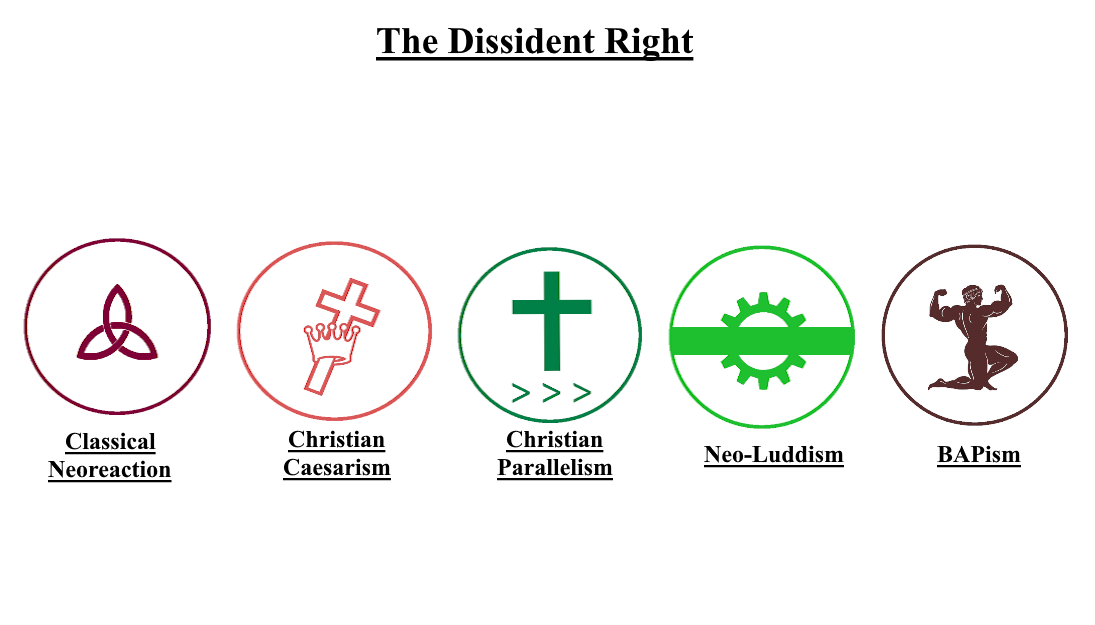Factions of the Rightosphere - The Dissident Right
Classical Neoreactionaries, Christian Caesarists, Christian Parallelists, Neo-Luddites, and BAPists.
The word ‘Dissident Right’ is very confused. In the introduction to this series, I distinguished between the ‘Third New Right’, ‘Dissident Right’, and various other ‘Rightosphere’ movements.
Because the ‘Dissident Right’ is so predominantly online, and made up of anons, I won’t be able to name everyone. My intention of naming individuals and publications is simply to give examples of the faction, and give proof I’m not just making stuff up.
Here are the five factions that fit into this grouping.
Classical Neoreactionaries
This is the movement that started it all off. Originally confined to niche tech circles, it was bankrolled by Silicon Valley barons like Peter Thiel, allowing it to gain a wider audience.
What is interesting is that the originators of the Neoreactionary (NRx) movement were not classical right-wingers. They were more in tune with libertarianism and the ‘Californian Ideology’, which was a 1990s form of Techno-Optimism which combined economic libertarianism with counter-cultural values.
Curtis Yarvin
Enter Curtis Yarvin.
In the late 2000s, Yarvin started his blog ‘Unqualified Reservations’ under the ‘Mencius Moldbug’ pseudonym, which is still accessible today.
Yarvin originated the word ‘Cathedral’ to describe a loose, decentralised, faceless network of establishment institutions pushing the same globalist, socially liberal values, that controls public discourse to get people to believe whatever benefits this hidden elite. This term has become standard in online right-wing circles.
Whilst the concept of the ‘Cathedral’ is his best known contribution, the ultimate focus of Yarvin’s writings is a critique of democracy.
Channelling Elite Theorists like Gaetano Mosca, Vilfredo Pareto, Robert Michels, and James Burnham, Yarvin sees elites as inevitable, and oligarchy an ‘Iron Law’ of human existence. But he views democracy as worse than Monarchy because it is dishonest and cryptic in how it operates.
Using a heavy dose of irony and humour, Yarvin dismantles the ideas of liberal/Whig teleology and ‘natural rights’. He advocates the doctrine of ‘Formalism’, which posits the simple principle that ‘the system should work in theory how it actually operates in practice.’
In light of this, his political ideal is to return to a reformulated version of Monarchy that he calls Neocameralism, whereby a ‘CEO-Monarch’ would be elected by shareholders, just like a joint-stock company. Most of the time this CEO-Monarch would have total power to control the state apparatus and make political decisions, though he would be accountable, being removable by an anonymous vote of the state’s ‘Board of Directors’ using blockchain.
As for the scale of polities, he envisions a system he calls ‘Patchwork’, where there are thousands of privately owned city states, with various overlapping relations with each other, and people can vote with their feet by moving to whichever they feel gives them the best deal.
Recently however, Yarvin has shown less emphasis on his unique political system proposal, and has had connections with staff in the Trump administration, advocating an ‘American Caesar’ who would ‘Reboot’ America, i.e., Trump. This discourse around an ‘American Caesar’ has become pretty normal on the American right, with the implication that Donald Trump should declare himself the ‘First American Emperor’. Yarvin has explicitly advocated RAGE (Retire all Government Employees) as the policy that Trump implement, and his influence can be seen in Schedule F and Project 2025.
The term ‘Red Pill’ was popularised by Curtis Yarvin, to describe the process by which a ‘Blue Pilled’ (normal liberal) person becomes awakened to the brutal reality that democracy and ‘human rights’ are a façade for power. This was already common in the ‘Manosphere’ scene, but it was Yarvin who oriented it towards Elite Theory.
Other parts of the lexicon he developed are ‘elves and hobbits’, ‘Cthulhu swims slowly, but he always swims left’, and the aforementioned RAGE (Retire all Government Employees).
All in all, it is impossible to understand the Dissident Right without understanding Yarvin. Whilst he is somewhat detached from the newer Substack and podcast scene, only coming on occasionally, all of the Dissident Right will have been inspired by Yarvin’s re-popularisation of Elite Theory
Neema Parvini
mostly and ‘OG Roland Rat’ on ‘X’) is an influential figure that pioneered the ‘British Dissident Right’ (though he dislikes the term ‘Dissident Right’), terming key canonical phrases like the ‘Boomer Truth Regime’, ‘Sensible Centrism’, ‘Back to Fresh Prince’, and ‘Putting the Woke Away’, that have become standard jargon across the Anglosphere online right.Parvini’s book ‘The Populist Delusion’ is a great introduction to Elite Theory for those unacquainted with it. It came out in 2022, a time when the failures of the Alt-Right, with its emphasis on ‘street movements’, ‘meme culture’, and a populist upsurge, were finally being critically analysed, due to the ‘spirit of 2016’ having been crushed by Big Tech censorship and the PR disaster that was Charlottesville.
As a Brit of Persian descent, and applying Neoreactionary analysis to British conditions, Parvini believes Tony Blair was a Schmittian-like figure who declared the ‘state of exception’ to be able to rewrite the rules of the British state, and the current regime in Britain being the one of Blair.
Parvini claims not to be ideological, and purely motivated by a dispassionate understanding of elite power structures (dismissing the idea of ‘positive visions’ in his hilarious Trumperton video). He often dismisses culture war issues and calls any progress on this front ‘containment’ and co-option.
Conclusion
What unites both of these individuals is their strong opposition to democracy. The features they particularly critique is the High Time Preference, the hidden elite power structure, the deception, the justification of controlling every aspect of life in the name of ‘the people’, and generally just being a fabricated and elaborate justification for the rule of an insidious elite.
A lot of these ideas weren’t exactly new, but they were synthesised and repackaged in a way that created an original movement. They revived Elite Theory to a new audience, in an era where populism was seen to have failed.
They form the bedrock from which the other factions of the Dissident Right are built, even though the others depart from Yarvin and Parvini’s theories in significant ways.
Christian Caesarists
This faction is pretty vague and disperse. Whilst the original NRx was mostly secular, the ‘Religious Turn’ (which is discussed here) in the late 2010s and early 2020s caused more Christian-inclined people to take up the mantle of Yarvin and Elite Theory.
One notable voice of this faction is Charles Haywood. Haywood outlines his vision in his ‘Foundationalist Manifesto’, which is essentially a futuristic and more aggressive form of Postliberalism, but one which is more explicitly anti-democratic. He also harshly criticises the Postliberals for not standing up for Whites and buying into the ‘America is a racist country’ narrative.
Haywood is also interesting as a representative of the rare ‘Christian Futurist’ tendency, combining space colonisation with a loyalty to Christendom. But he doesn’t rely on Christian arguments for his beliefs. His manifesto has a funny line where he talks about the importance of religion, and the reason why Christianity will be the most obvious choice due to its historical significance in the West. But then, after he has made a strong secular case, he says ‘and it is also true, which is a bonus’, a funny example of compartmentalisation which I find quite difficult.
Christian Parallelists
This faction is kind of a more radical version of Rod Dreher’s ‘The Benedict Option’, though Dreher is universally disliked across the Dissident Right for the Thomas Achord Affair, of which Charles Haywood led the charge against him. These individuals think that modern secular society is fundamentally broken and unreformable. There is no way out of our current malaise, no ‘soft landing’, until we fully return to Christ, and live a trad-life of Christian communes.
This group sees ‘secularism’ as the problem, the ill that caused all the rest. Unlike some of the Postliberals who will dress up this by saying their issue is liberalism, the Christian Parallelists make it clear that there is no way back to normality without a return to Christianity.
They are very much in the Accelerationist camp, taking the Yarvin approach that doing anything in the realm of politics will just strengthen the enemy, and that it’s better to just lay low. However, they take this idea further than Yarvin, who at least opens up the possibility of a Caesarist reconquest.
Examples of this faction include
and . For those looking for some more figures I advise you to look at (a lot of it paywalled) and the website Praxarchy.Neo-Luddites
This faction is hard to place and bleeds into other factions. Just know they are the polar opposites of the Techno-Optimists we discussed in the last section, as different as it’s possible to be in the Rightosphere.
As the name suggests, Neo-Luddites have a suspicion of technology. They are all very distrustful of transhumanism, and see it as an extension of the transgender industry, all part of the same project to turn human beings into something ‘other’ than what they are, and easier to control in the process.
Mary Harrington
The most moderate and mainstream representative of this faction is
. She serves as a bridge between TERFism and the Dissident Right, with her work ‘Feminism Against Progress’ (2022) making the case of a new covenant between the sexes based on interdependence and difference.Her narrative of industrialisation is unique. She argues that the shift from an agricultural to industrial society hurt women at the expense of men, who had previously been interdependent on each other, and feminism is an overcorrection to that.
Taking her Gender Critical Feminism to more comprehensive conclusions, she sees transgenderism as part of a broader movement to dismantle what it means to be human, i.e., transhumanism, and highlights the common funding between the two.
She calls this ‘Progress Theology’, a reckless pursuit of technological and social progress regardless of the costs, and transgenderism. Harrington is an opponent of artificial wombs, in-vitro fertilisation, and surrogacy, but also the contraceptive pill, as the ‘first transhumanist technology’ that fundamentally altered the natural relationship between the sexes.
Kaczynskites
Then of course there’s the most famous Neo-Luddite, Ted Kaczynski, known as the ‘Unabomber’. Whilst far predating the Dissident Right himself, Kaczynski has become something of a cult hero among them, with the meme ‘Based and Ted Pilled’ going viral in this space. It’s hard to name any particular commentator who is a pure ‘Kaczynskite’, other than a Discord server claiming to represent the ‘Dissident Right’ called ‘New Aristocracy’ who were very oriented around his work, which I found rather peculiar.
His manifesto, ‘Industrial Society and Its Future’ (1995), makes the point that technology is both assisted by and encourages an ever-greater centralisation of state power. Covid arguably proved many of his predictions right, as the obsessive focus on particular statistics, due to the ability to ‘test and trace’, served to justify a never ending cycle of government mandates and restrictions.
Conclusion
This Neo-Luddite tendency bleeds into anti-vaxxers (with the exception of Mary Harrington, who seems too intelligent for that), who are firmly in the ‘Conspiracy Theorist’ box, and who I will discuss when I get around to talking about the Conspiracy Theorists.
However, it would be wrong to dismiss this faction’s most eloquent writers completely, with Mary Harrington and Ted Kaczynski (his methods notwithstanding) making some interesting points that deserve to be taken into consideration.
BAPists
Finally we have the BAPists.
Bronze Age Pervert (Costin Alamariu) and his book ‘Bronze Age Mindset’ (2018) was brought into mainstream conservative circles by Curtis Yarvin, who had various Claremont fellows read it. Bronze Age Pervert (BAP) presents a Nietzschean vision that valorises the traditional masculine warrior and ‘Faustian’ spirit of the West, and claims that this spirit is being sapped by the ‘Longhouse’, a now standard term on the Dissident Right.
BAP termed the word ‘Longhouse’ to describe female domination of community life. Contrary to mainstream narratives that present humanity as traditionally patriarchal, BAP puts forward the narrative that women have almost always controlled society behind the scenes, with Ancient Greece and the Enlightenment-era West some of the few exceptions. He criticises the ‘Bugmen’, a veiled reference to Klaus Schwab, who serve the Longhouse by facilitating the ever greater managerial control over young men, sapping out their Vitality.
In response to this, BAP wants to create a brotherly fraternal order, where men can naturally dominate over weaker, inferior forces and beings in a Nietzschean fashion. Inspired by various warrior castes in the pre-Christian age, he calls this the ‘Bronze Age Mindset’.
He brings a rival Nietzschean ‘Vitalist’ strand to the Dissident Right, which is often contrasted to the Christian side. He also is a big critic of Postliberalism, with his article ‘The Populist Moment Never Happened’ in ‘Mans World’ about Javier Milei making the distinctions clear between what he represents compared to the various ‘economic leftist’-adjacent tendencies.
The reason why he is so influential is mostly the terms he brought to the sphere, like the whole idea and concept of the ‘Longhouse’. He also presents a unique account of the toxic feminisation of society, and the necessity of recovering a lost masculine energy that Western civilisation has lost. No other figure in the Dissident Right has really articulated this better than BAP.
BAP has created a space known as the BAPsphere which is personified in the ‘Man’s World’ magazine, and has various other contributors and which also intersects with the Neo-Luddite faction, though with an explicitly masculine bent, so Mary Harrington’s brand of Luddite TERFism wouldn’t fit.
Conclusion
It is harder to track the Dissident Right compared to the more mainstream commentators, simply because there are far more people who are in the online space. Findmyfrens.net and
, particularly who New Right Poast recommends, will give you some people who very much belong in the ‘Dissident Right’ sphere I’m talking about.As always, my factions are to some degree subjective. There is a large degree of overlap and ambiguity and I am choosing to draw the lines in certain places and putting people who could be in different categories into one or the other.
The next article will be about the ‘Racialist Right.’
As always, thanks for reading and I hope you found my breakdown useful. If you enjoyed this article, please subscribe.
Click here for the next entry, on the Racialist Right.










Your description of the dissident right really suggests it as a very nascent faction.
It reads like: Over here we have a Jewish Elite technocrat that thinks he is a dark elf and wants the world to be formalized. And over here is a bunch of guys who are obsessed with being super buff. And over here is a hyper-intelligent man who hates technology so much that he sends bombs to random people in the mail. And here is a doom-mongering British guy who is obsessed with the hand gestures of a British Politician from the 90s who he believes is the dark lord. And over here we have some very dedicated traditional Catholics.
In any other time, you would never categorize these people in the same group, but here we are. The political gimbals really have changed.
I listened to a lecture by Thiel recently where he mentions BAP and it surprised me. Never realized how big of an influence he had thru Claremont and others. I think there is a lot of overlap. I’ve been reading into your takes on Techno-Optomism and what I can only call the “Secular Right” and I think we agree on a lot of things. Very well done sir.